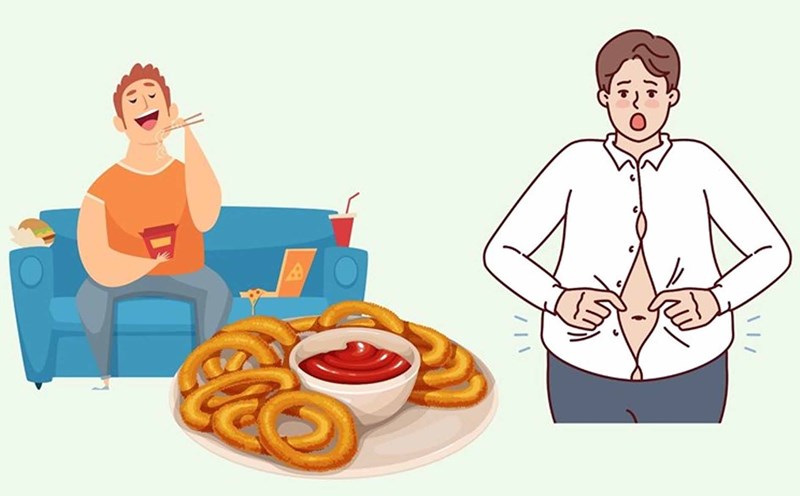According to Doctor Hoang Minh Khoa II - Xanh Pon General Hospital (Hanoi), today's obesity is determined mainly based on height and weight by calculating body mass index (BMI).
The BMI from 25.0 to 29.9 is equivalent to being overweight.
The BMI of 30.0 to 34.9 is diagnosed as being overweight at level 1.
The BMI from 35.0 to 39.9 is diagnosed as obese with grade 2.
A BMI of 40.0 or higher is considered extreme or severe obesity (obesity level 3).
There are many causes of obesity, including a combination of many direct and indirect factors.
Unreasonable diet
Use processed foods and fast foods: These foods are often high in calories, rich in trans fat and sugar but poor in nutrients. Carb-based and soft drinks: Sugary drinks increase calorie intake without creating a feeling of fullness, making it easier for you to overeat.
Unbalanced nutrition: When calorie intake is greater than calorie intake, excess energy will be stored as fat.
Lazy to get physical
Lenient lifestyle: Reduces daily calorie intake, making it easier for excess energy to accumulate.
Lack of exercise habits: Physical activity not only burns calories but also improves metabolism. When not exercised enough, the body easily stores fat, especially in the abdomen.
Genetic factors
Impact of genes: Some genes play a role in regulating hunger and satiety and how the body converts food into energy. If you have these genes, your risk of obesity will be higher.
Family history: Studies show that children with obese parents are at high risk of obesity.
Psychological stress
Increased cortisol hormone: When stress is prolonged, cortisol levels in the body increase, stimulating cravings for sweets and greasy foods, thereby affecting the brain area that controls satiety, making you tend to consume a lot of energy-rich foods.
Eat emotionally: Many people eat emotionally to deal with negative emotions such as anxiety, sadness or loneliness. This leads to uncontrolled food consumption, causing weight gain.
Endocrinological disorders
Hypothyroidism: The thyroid gland does not produce enough hormones, slowing down metabolism, thereby leading to mild weight gain.
Multi-capillary ovaries: In women, this disorder causes hormonal imbalance and affects metabolism, leading to weight gain.
Postpartum obesity
Hormonal changes: After giving birth, hormonal changes affect hunger and metabolism, making it easy for the body to gain weight.
Lack of sleep: Postpartum women often do not sleep enough, disrupting the hormones leptin and ghrelin, affecting satiety and cravings.
Psychological stress: The pressure to take care of children, lack of support from the family, and postpartum stress can also cause uncontrolled eating.
Other causes
There are other causes of obesity such as lack of sleep; skipping main meals; drinking a lot of soft drinks, alcohol, beer; uncontrolled snacking; side effects of drugs; sleeping a lot...
Subjects at high risk of obesity
People with a family history of obesity are at higher risk of obesity due to genetic factors and coexisting habits such as unhealthy eating and lack of exercise.
People who are sedentary and less physically active, such as office workers, students, and the elderly, are at risk of excess fat accumulation.
Postpartum women experience hormonal changes, lack of sleep, lack of exercise, increasing the risk of fat accumulation, especially in the abdomen, leading to weight gain.
Women during menopause due to hormonal decline along with lack of exercise during this period will slow down metabolism and fat storage, especially in the abdomen.
People with hormonal diseases such as hypothyroidism, polycystic ovary, and Cushing's syndrome cause hormonal disorders, leading to slow metabolism, fat accumulation in the abdomen, face, and body.











